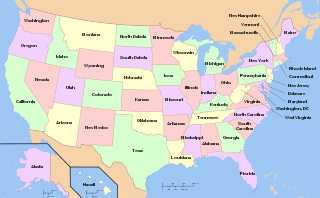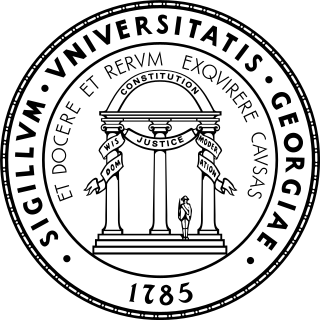
Pork barrel is a metaphor for the appropriation of government spending for localized projects secured solely or primarily to bring money to a representative's district. The usage originated in American English. Scholars use it as a technical term regarding legislative control of local appropriations. In election campaigns, the term is used in derogatory fashion to attack opponents.
Block grant refers to a grant-in-aid of a specified amount from the Federal government of the United States to individual states and local governments to help support various broad purpose programs, such as law enforcement, social services, public health, and community development. Block grants have less oversight from the federal government and provide flexibility to each state in terms of designing and implementing programs. Block grants, categorical grants, and general revenue sharing are three types of federal government grants-in-aid programs.

The United States Senate Committee on Foreign Relations is a standing committee of the United States Senate. It is charged with leading foreign-policy legislation and debate in the Senate. The Foreign Relations Committee is generally responsible for overseeing and funding foreign aid programs as well as funding arms sales and training for national allies. The committee is also responsible for holding confirmation hearings for high-level positions in the Department of State. The committee has considered, debated, and reported important treaties and legislation, ranging from the Alaska purchase in 1867 to the establishment of the United Nations in 1945. It also holds jurisdiction over all diplomatic nominations. Along with the Finance and Judiciary Committees, the Foreign Relations Committee is one of the oldest in the Senate, going back to the initial creation of committees in 1816. Its sister committee in the House of Representatives is the Committee on Foreign Affairs.
As a subfield of public economics, fiscal federalism is concerned with "understanding which functions and instruments are best centralized and which are best placed in the sphere of decentralized levels of government". In other words, it is the study of how competencies and fiscal instruments are allocated across different (vertical) layers of the administration. An important part of its subject matter is the system of transfer payments or grants by which a central government shares its revenues with lower levels of government.
Fiscal imbalance is a mismatch in the revenue powers and expenditure responsibilities of a government.
Federalism was adopted, as a constitutional principle, in Australia on 1 January 1901 – the date upon which the six self-governing Australian Colonies of New South Wales, Queensland, South Australia, Tasmania, Victoria, and Western Australia federated, formally constituting the Commonwealth of Australia. It remains a federation of those six "original States" under the Constitution of Australia.
Foot voting is expressing one's preferences through one's actions, by voluntarily participating in or withdrawing from an activity, group, or process; especially, physical migration to leave a situation one does not like, or to move to a situation one regards as more beneficial. People who engage in foot voting are said to "vote with their feet".

Federalism in the United States, also referred to as the doctrine of shared sovereignty, is the constitutional division of power between U.S. state governments and the federal government of the United States. Since the founding of the country, and particularly with the end of the American Civil War, power shifted away from the states and toward the national government. The progression of federalism includes dual, state-centered, and new federalism.
Charles Mills Tiebout (1924–1968) was an economist and geographer most known for his development of the Tiebout model, which suggested that there were actually non-political solutions to the free rider problem in local governance. He graduated from Wesleyan University in 1950, and received a PhD in economics in University of Michigan in 1957. He was Professor of Economics and Geography at the University of Washington. He died suddenly on January 16, 1968, at age 43.
Deil S. Wright was an American political scientist, who specialized in public administration and spent much of his career as a professor at the University of North Carolina at Chapel Hill. He was an expert on intergovernmental relations, and wrote a leading textbook on that subject.

Daniel Judah Elazar was a professor of political science at Bar-Ilan University (Israel) and Temple University, Philadelphia, Pennsylvania. He was the Director of the Center for the Study of Federalism at Temple University and the founder and president of the Jerusalem Center for Public Affairs.
An earmark is a provision inserted into a discretionary spending appropriations bill that directs funds to a specific recipient while circumventing the merit-based or competitive funds allocation process. Earmarks feature in American and South African public finance.

Norman Irving Wengert was an American political scientist who wrote about the politics of natural resources, advanced a seminal theory of the "politics of getting", and had a number of significant roles in his public and academic career. He was born in Milwaukee, Wisconsin to Eugene F. and Lydia Semmann Wengert. He pioneered the revival of the study of political economy in the United States with publication of Natural Resources and the Political Struggle, and later authored more than fifty monographs and studies on the political economy and public administration of environmental resources. His scholarship explored the politics of natural resources and environmental policy formation and administration, with emphases in national energy policy, urban water planning and management, land use planning and controls, national forest management, and citizen participation in administrative processes.
Arthur Whittier MacMahon was an American political scientist, president of the American Political Science Association in 1946–47, and a pioneer in the academic study of public administration.
Vincent Alfred Ostrom was an American political economist and the Founding Director of the Ostrom Workshop based at Indiana University and the Arthur F. Bentley Professor Emeritus of Political Science. He and his wife, the economist Elinor Ostrom, made numerous contributions to the field of political science, political economy, and public choice.
Keith Edward Hamm is an American political scientist and Edwards Professor of political science at Rice University. He is an expert on state legislatures. His research focuses on legislative behavior, campaign finance, interest groups, state politics and urban politics.
William Breit (1933–2011) was an American economist, mystery novelist, and professional comedian. Breit was born in New Orleans. He received his undergraduate and master's degrees from the University of Texas and his Ph.D from Michigan State University in 1961. He was an Assistant and Associate Professor of Economics at Louisiana State University (1961-1965) On the recommendation of Milton Friedman he was interviewed and hired at the University of Virginia where he was Associate Professor and Professor of Economics (1965-1983). He returned to his San Antonio as the E.M. Stevens Distinguished Professor of Economics at Trinity University in 1983 and retired as the Vernon F. Taylor Distinguished Professor Emeritus in 2002. He is considered an expert in the history of economic thought and anti-trust economics. He established the Nobel Laureate Lecture Series at Trinity University and is most notable as a mystery novelist where their murder mysteries are solved by applying basic economic principles.
In public choice theory, tax choice is the belief that individual taxpayers should have direct control over how their taxes are spent. Its proponents apply the theory of consumer choice to public finance. They claim taxpayers react positively when they are allowed to allocate portions of their taxes to specific spending.
The following outline is provided as an overview of and topical guide to politics and political science:
The distributive tendency is the propensity of the United States Congress to lean towards distributive politics, especially to gain political support and credit claim. Through the distributive tendency, Congress’ bills evolve over the drafting process to become more broad and reaching with their benefits. Legislation that follows the distributive tendency has benefits that flow to many districts and can come in many forms, though in current day they are often monetary.











